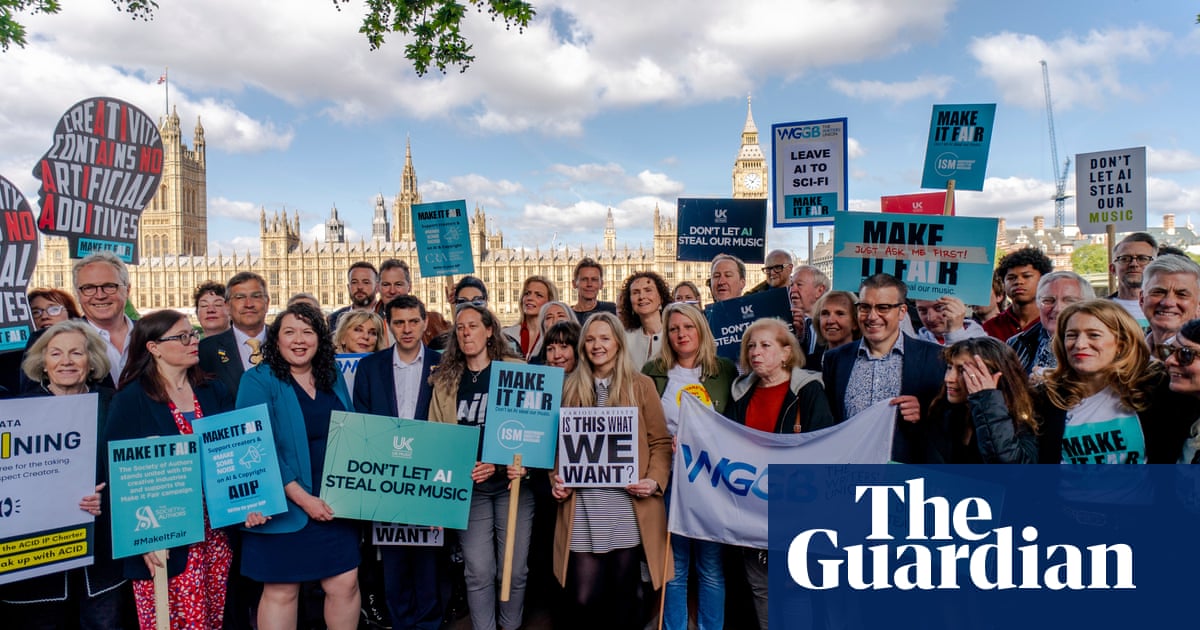Campaigners have accused ministers of lying to parliament and the creative industries after the government signalled it would not force AI companies to disclose how they train their models.
Ministers are holding firm in a standoff with theHouse of Lords, which has called for artists to be offered immediate copyright protection against artificial intelligence companies.
Peers votedby 221 to 116 on Wednesdayto insist on an amendment to the data bill that would force AI firms to be transparent about what copyrighted material they use to train their models.
In an amendment tabled on Friday, the government dismissed the Lords’ request and reiterated its promise to publish an economic impact assessment and technical reports on the future of AI and copyright regulation.
Beeban Kidron, the cross-bench peer and film director who has campaigned on behalf of the industry, said during Wednesday’s debate that she would “accept anything that the Commons does” after this week. “I will not stand in front of your Lordships again and press our case,” she said.
But the News Media Association (NMA), which represents publishers including the Guardian, said peers could table further amendments to the data bill when it returns to the Lords next Wednesday.
Industry figures said the government was acting in bad faith by not addressing the Lords’ concerns and called for it to make further amendments of its own before MPs vote on it on Tuesday.
Kidron said: “The government has repeatedly taken all protections for UK copyrights holders out of the data bill. In doing so they have shafted the creative industries, and they have proved willing to decimate the UK’s second biggest industrial sector. They have lied to parliament, and they are lying to the sector.”
She said the government’s action “adds another sector to the growing number that have an unbridgeable gap of trust with the government”.
Owen Meredith, chief executive of the NMA, said: “the government’s refusal to listen to the strong view of the Lords … risks undermining the legislative process.
“There is still time for the government to do the right thing, and take transparency powers in this bill. This would be a key step towards rebuilding trust with a £126bn industry.”
Sign up toHeadlines UK
Get the day’s headlines and highlights emailed direct to you every morning
after newsletter promotion
The government’s approach to copyright has drawn the ire of major creative artists and organisations including Paul McCartney, Kate Bush and the National Theatre, with Elton John describing the situation as an “existential issue” this week.
Opponents of the plans have warned that even if the attempts to insert clauses into the data bill fail, the government could be challenged in the courts over the proposed changes.
The consultation on copyright changes, which is due to produce its findings before the end of the year, contains four options: to let AI companies use copyrighted work without permission, alongside an option for artists to “opt out” of the process; to leave the situation unchanged; to require AI companies to seek licences for using copyrighted work; and to allow AI firms to use copyrighted work with no opt-out for creative companies and individuals.
Kyle has said the copyright-waiver-plus-opt-out scenario is no longer the government’s preferred option, but Kidron’s amendments have attempted to head off that option by effectively requiring tech companies to seek licensing deals for any content that they use to train their AI models.
